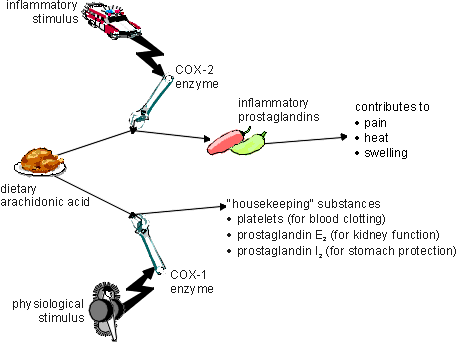
Metabolism
Ibuprofen is a non-steroidal anti-inflammatory agent belonging to a group of propionic acid derivatives. It has three major types of effect which are all linked to its primary action, the inhibition of an enzyme known as arachidonate cyclooxygenase or COX of which there are two types COX-1 and COX-2 (click here for diagram).
The cyclooxygenase pathway:-

(This image was copied from http://elfstrom.com without permission)
The inhibition of COX-2 inhibits the production of prostaglandins and thromboxanes. This, in turn, leads to the following three major effects:-
Anti-inflammatory effect: modification of inflammatory reactions via decrease in vasodilator prostaglandins.
Analgesic effect: reduction of certain sorts of pain via reduced sensitivity of nerves to certain inflammatory mediators.
Antipyretic effect: lowering of a raised temperature via decrease in a mediator prostaglandin which is responsible for elevating the hypothalamic temperature control.
Unwanted effects are mainly due to the inhibition of COX-1 since this is only concerned with the production of housekeeping substances and not related to prostaglandin synthesis.